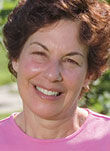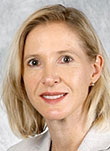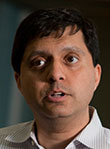Bassuk, Caudill, Manohar named Weiss fellows
By Daniel Aloi



Nina Bassuk, professor of horticulture; Marie Caudill, professor in the Division of Nutritional Sciences; and Rajit Manohar, professor of electrical and computer engineering, are the newest recipients of Stephen H. Weiss Presidential Fellowships in recognition of their teaching of undergraduate students. President David Skorton announced the Weiss fellows Jan. 30 at a meeting of the Cornell Board of Trustees.
“Nina, Marie and Rajit exemplify the best that Cornell seeks to offer its students,” Skorton said. “They are enormously talented researchers and academic leaders, who inspire undergraduates through their example and boundless energy as teachers and mentors.”
The award, conceived and funded by former chair of the Board of Trustees Stephen H. Weiss ’57, was established in 1992 to recognize tenured Cornell faculty members for inspiring, distinguished teaching and mentoring of undergraduates. The Weiss fellows will be honored at a ceremony in the spring.
Bassuk, who marked her 34th year at Cornell in 2014, is known for her innovative teaching and for having a profound and lasting influence on her students.
Her two-course series Creating the Urban Eden incorporates not only a 300-acre campus as an extended classroom but several resources developed in her research on enhancing the functions of plants and trees in urban ecosystems. These include a textbook, “Trees in the Urban Landscape: Site Assessment, Design and Installation” (2004); a “Plant by Phone” service with her recorded descriptions of trees and plants; and a Campus Tree Identification mobile phone app with information on more than 200 plant species.
Bassuk brings tools, plants and soil samples into the classroom but ensures that much of her students’ learning occurs outdoors, leading them on weekly “plant walks” on campus and joining them in horticultural projects. She has enabled students across the university to understand the natural world and what it takes to be successful environmental stewards, adapting her teaching style to students’ individual needs.
“She helps and challenges students to develop their own methods of learning,” one of Bassuk’s students wrote. “Her time and expertise were invaluable.”
Caudill came to Cornell in 2007 and “is a spectacular example of what it means to be a creative and engaging educator,” one student noted. “[Her] lectures were wonderfully crafted: chock-full of relevant, critical information.”
Enrollment in her Nutrition and Disease course has grown from 26 students in 2008-09 to 159 students in 2013-14. Caudill devotes one class a week to trending research topics, evaluates students based on their ability to solve clinical problems, and supplements her lectures with videos and webcasts.
She gives undergraduates opportunities to participate in her research, focused on nutrient intake recommendations to promote human health and mother and child nutrition and well-being; and to co-author resulting publications. Caudill often designs research projects based on student interests and regularly supports minority students’ success. Former students have credited her influence on their pursuit of careers in medicine, research and teaching.
“Her teaching focused on the pursuit of greater meaning, which was incredibly empowering,” Kelsey Shields ’12 said.
The Omega Greek Honor Society has recognized Caudill as Outstanding Faculty Member several times. Her other honors include a State University of New York Chancellor’s Award for Teaching Excellence.
Manohar has received seven teaching awards from the College of Engineering and is known as a passionate, innovative instructor and an inspiring research mentor to many undergraduates. He also serves as associate dean for academic affairs at Cornell Tech in New York City.
After he arrived at Cornell in 1998, Manohar developed a new course in computer organization that became integral to an updated computer engineering curriculum he helped devise. A design-contest component he introduced to the course helped make it a popular elective among electrical engineering and computer science majors.
After 10 years, he completely redesigned the course to focus on embedded systems, as more types of machines began incorporating computers and processors. He also developed detailed course notes for material so new that no textbook exists, as well as new hands-on laboratory exercises.
“He does not just teach students about computers, he actually gets them involved in their design and application to real-world experiments. Rajit brings the students right up to the leading edge of application and understanding,” wrote faculty colleague Clifford Pollock, director of the School of Electrical and Computer Engineering and a Weiss fellow.
Media Contact
Get Cornell news delivered right to your inbox.
Subscribe